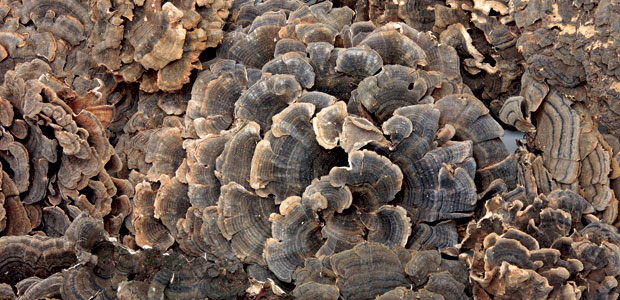Advertisement
Maitake Mushrooms
Cellular level immune protection

The maitake mushroom (Grifola frondosa) has been recognized as a source of immune-enhancing compounds that offer significant health benefits.
In 1984 Dr. Hiroaki Nanba identified a specific extract of maitake that had a significant ability to stimulate the white blood cells known as macrophages (literal translation, “big
eaters”). These white blood cells are capable of engulfing foreign particles, including damaged or mutated cells, bacteria, and cellular debris. Dr. Nanba’s maitake extract contained polysaccharide compounds (beta-1,6-glucan and beta-1,3-glucan) and protein.
While other medicinal mushrooms may have similar beta-glucan constituents, Dr. Nanba found that the beta-glucans in maitake have a unique and complex structure with a greater number of branching side chains. It is thought that the greater the degree of branching, the higher the likelihood that the beta-glucan will reach and activate a greater number of immune cells.
How Maitake Boosts Immunity
Maitake glucan-protein extracts may exert an effect on immune function. In a nutshell, it appears that the glucan-protein complexes bind to receptors on the outer membranes of macrophages and other white blood cells including natural killer cells and cytotoxic T cells. The immune cells are very important in protecting against and fighting cancer because they can attack tumour cells directly.
Just like a key in a lock, the binding of the beta-glucan literally flips white blood cells on and triggers a chain reaction leading to increased immune activity. In addition to increasing the ability of the macrophages to engulf and destroy cancer cells, microbes, and other foreign cells, the beta-glucan binding stimulates production of signalling proteins in the immune system such as interleukin-1, interleukin-2, and lymphokines, which ramp up defences by activating immune cells.
Beta-glucan-protein complexes also stimulate the production of white blood cells within the bone marrow. Reduced bone marrow production means lowered white blood cell counts and an increased risk of infection and cancer. This beneficial effect of the beta-glucan-protein complex may be put to good use in cancer patients undergoing radiation or chemotherapy.
Beta-glucans are found in many other forms, but the unique branching pattern of maitake beta-glucans make maitake an ideal source of these molecules. For superior immune support and cellular health protection, maitake mushroom extract is a well-researched, natural option.




